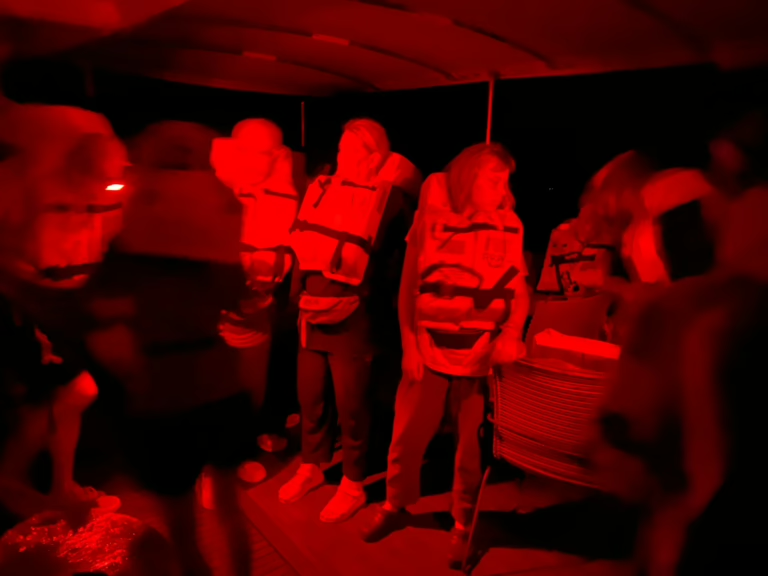Mediterranean Sea – On the upper deck of a Global Sumud Flotilla ship, volunteers gathered, their vessel laden with humanitarian aid destined for Gaza. United by a shared mission, they prepared for the journey ahead.
Emergency procedures were carefully reviewed and practiced: life jackets were distributed, head counts conducted, and assembly points clearly assigned.
The crew rehearsed responses to common maritime emergencies such as onboard fires, man-overboard incidents, and collisions.
However, this training carried an additional, unique dimension.
Volunteers were briefed on how to respond nonviolently if Israeli forces intercepted, boarded, and detained the ship. The emphasis was on peaceful compliance, reflecting the flotilla’s humanitarian purpose.
Having departed from Sicily, Italy, the flotilla was nearing the so-called “yellow zone” – international waters between Italy and Cyprus where Israeli military actions are a known threat – making it crucial to rehearse protocols for potential confrontations.
Recycling Old Propaganda Tactics
The Israeli Ministry of Foreign Affairs recently labeled the humanitarian flotilla, which aims to challenge the blockade on Gaza, as a “jihadi flotilla” with alleged Hamas affiliations.
The so-called “Flotilla to Gaza” is openly backed by jihadi Hamas.
In Hamas’s own words: “We call for mobilizing all means to support the Global Steadfastness Flotilla heading to Gaza.”
This is not humanitarian. This is a jihadist initiative serving the terror group’s agenda. pic.twitter.com/vciWdnTswC
– Israel Foreign Ministry (@IsraelMFA) September 18, 2025
Earlier in the month, as the flotilla departed from Spain, Israeli National Security Minister Itamar Ben-Gvir declared his intention to brand the activists as “terrorists” and detain them accordingly.
Saif Abukeshek, a member of the flotilla’s steering committee, dismissed these accusations as “psychological warfare,” describing the propaganda as a recycled tactic.
During the training, a coordinator addressed the group: “We must collectively decide how to respond if soldiers begin to assault one of us.”
The room fell silent, but the question demanded an answer. Taking the bullhorn, the coordinator spoke firmly:
“If I am dragged away or struck, I ask that none of you intervene or plead with the soldiers. Please honor my choice.”
The bullhorn circulated among the volunteers, who echoed the sentiment. By the third person, the phrase was succinctly summarized as “the same,” with unanimous agreement.
This approach aims to minimize escalation. Any resistance or verbal protest could provoke harsher treatment from the soldiers.
One volunteer articulated the rationale: “Reacting or speaking out while being attacked endangers not only yourself but also your fellow volunteers, and it undermines the group’s collective resolve.”
Another shared with Al Jazeera: “We understand the purpose of our mission and the risks involved.”
Endurance Amidst Mental and Physical Strain
The flotilla’s organizers and volunteers have endured numerous setbacks and hardships.
From drone strikes targeting the ships while docked in Tunisia, to mechanical failures on vessels ill-equipped for the Mediterranean’s unpredictable conditions, the challenges have been relentless. Coordinating a civilian-led, underfunded mission to Gaza has tested everyone’s resolve.
Each crew member takes turns on night watch, vigilantly scanning the skies for drones while others rest.
When asked what fuels their determination, the volunteers unanimously cite a deep commitment to aid Gaza’s population, who face relentless bombardment, starvation, and devastation amid ongoing conflict.
They are fully aware of the dangers ahead, recalling that previous flotillas have been intercepted by Israeli forces, including the deadly raid on the Mavi Marmara ten years ago that claimed ten lives.
After departing Tunisia for Sicily on Tuesday, the flotilla sailed with fewer volunteers than initially planned, following difficult decisions.
Demand to join the mission exceeded available space, especially as some vessels failed safety inspections, raising concerns about their seaworthiness in the Mediterranean’s challenging environment.

In Bizerte, Tunisia, names were called, crews reorganized, and heartfelt goodbyes exchanged among volunteers who had formed close bonds.
Though their time aboard had ended, their support for the Gaza-bound flotilla would persist from shore.
Some sought to reclaim their places on the boats, while others stayed to assist until they had to return to hotels awaiting flights home.
“Please place this Palestinian flag somewhere on the ship. It’s been in my friend’s window for years,” requested Marcin, a Polish volunteer residing in Norway, who was among those removed from the crew list.
Eventually, all volunteers boarded their designated vessels and met their teams. Everyone pitched in to clean and ready the ships for the next stage toward Italy. Experienced sailors guided newcomers, who quickly adapted to their roles.
After several days in Italy, the flotilla resumed its voyage, navigating through the yellow zone and edging closer to the “red zone,” located approximately 100 nautical miles (185 km) from Gaza’s coast, where risks intensify.
Throughout the journey, safety drills and preparedness exercises continue unabated.


















